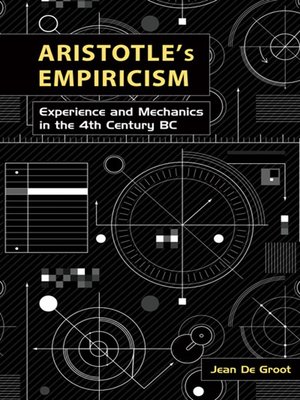
Sign up to save your library
With an OverDrive account, you can save your favorite libraries for at-a-glance information about availability. Find out more about OverDrive accounts.
Find this title in Libby, the library reading app by OverDrive.



Search for a digital library with this title
Title found at these libraries:
| Library Name | Distance |
|---|---|
| Loading... |
In Aristotle's Empiricism, Jean De Groot argues that an important part of Aristotle's natural philosophy has remained largely unexplored. She shows that much of Aristotle's analysis of natural movement is influenced by mathematical mechanics that emerged from late Pythagorean thought. De Groot draws upon the pseudo-Aristotelian Physical Problems XVI to reconstruct the context of mechanics of Aristotle's time and to trace the development of kinematic thinking from Archytas to the Aristotelian Mechanics. She argues that the influence of kinematics on Aristotle pinpoints the original meaning of his concept of power, or potentiality, as a physicalistic meaning addressed to the problem of movement.
De Groot identifies epistemic features of kinematics as a scientific enterprise, including economy of explanation and direct inference to a principle. She shows how these features are woven into Aristotle's thinking in the motion books of the Physics, On the Heavens, and Movement of Animals. The book places in doubt both the view that Aristotle's natural philosophy codifies opinions held by convention and, alternatively, the view that the cogency of his scientific ideas depends on metaphysics.







